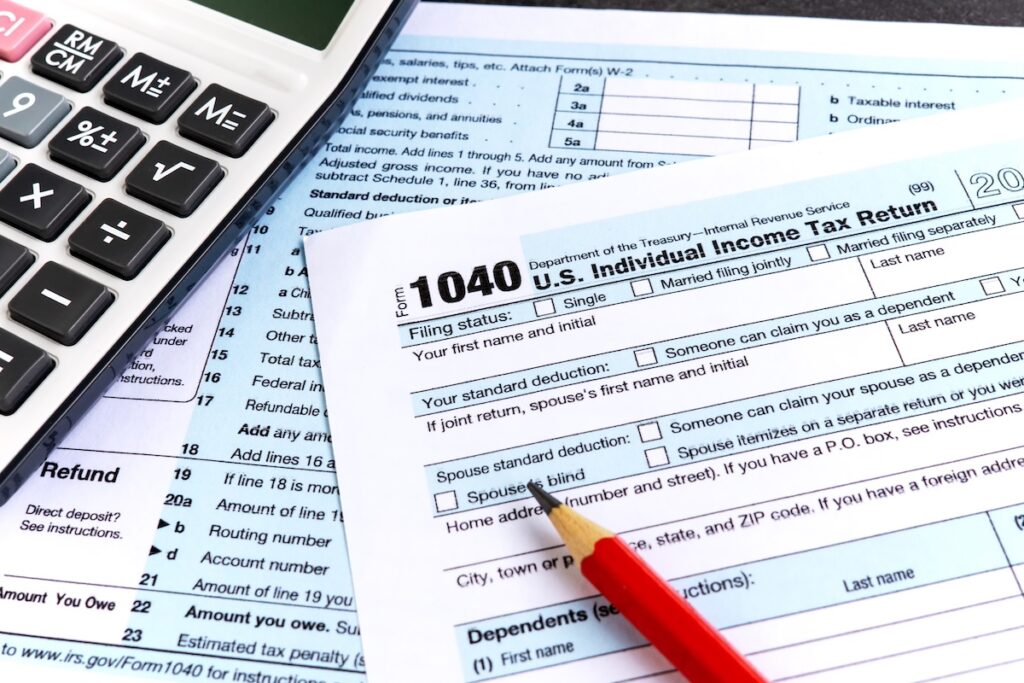Trump’s Big Beautiful Bill Passed: What US Expats Need to Know
July 8, 2025 | Featured, Paying Taxes | 5 minute read
Expat Tax Blog. Tax Tips for US Americans abroad.
Updated October 11, 2025
 All blogs are verified by Enrolled Agents and CPAs
All blogs are verified by Enrolled Agents and CPAs
Updated October 11, 2025

The Big Beautiful Bill is no longer just a headline or political soundbite, it’s now law. Passed in July 2025, the One Big Beautiful Bill Act ushers in some of the most sweeping tax changes since the 2017 Tax Cuts and Jobs Act. While the bill covers everything from spending caps to energy policy, it includes several provisions with major implications for Americans living abroad.
From removing section 899’s proposed surtax and preserving access to the Foreign Tax Credit (FTC), plus new reporting rules and updates to credits like the Child Tax Credit, the Big Beautiful Bill brings key changes to how Americans abroad will file their US taxes in 2026. Here’s a breakdown of the most important changes for US expats and what you should do next.
1. Foreign Tax Credit Fully Preserved After Surtax Scrapped
Section 899, sometimes called the “revenge tax”, was a proposed surtax on certain foreign corporations and business entities with US-connected foreign income. It specifically targeted countries the US viewed as having “unfair” or discriminatory tax systems. The proposal would have limited the use of the Foreign Tax Credit (FTC) on the new surtax, potentially affecting expats earning US-connected income through certain foreign entities in places like France, Germany, Canada, or the UK.
However, after strong opposition in Congress, the measure was removed from the final bill. The Foreign Tax Credit (FTC) remains fully available for expats to offset foreign taxes paid; no new surtax or restrictions will apply.
Why this matters: If you live in a high-tax country and rely on the FTC to reduce your US tax bill, particularly on US-connected income earned through foreign companies, you’re in the clear. You can continue using the FTC without facing additional US tax it wouldn’t have covered.
2. Stricter Reporting Rules and Heavier Penalties
US expats are no strangers to complex filing requirements, but the new law expands financial asset reporting obligations. Lowering thresholds for the Foreign Account Tax Compliance Act (FATCA) and the Report of Foreign Bank and Financial Accounts (FBAR) disclosures may trigger more filing requirements for expats who previously didn’t meet the thresholds. While no new thresholds have been officially announced, as of July 2025, the new law allows for them to be lowered.
The law also accelerates some filing deadlines and reduces extension periods for certain international forms. Lawmakers have increased penalties for noncompliance across the board, particularly for unreported foreign accounts, gifts, and inheritances.
Self-employed expats will also face more scrutiny, with potential limitations on Section 179 depreciation and deductions related to small foreign-based businesses.
Impact on US expat reporting: If you manage foreign accounts, receive overseas gifts, or run a business abroad, expect to file more forms with tighter deadlines and steeper penalties if you miss them.
3. Big Beautiful Bill Child Tax Credit Changes: One Parent SSN Rule Now Applies
Beginning with the 2025 tax year, the Child Tax Credit (CTC) will increase from $2,000 to $2,200 per qualifying child. The amount will be adjusted for inflation beginning in 2027 and remains in effect through 2028 under current law. The income phase-out thresholds to qualify for the full credit remain high, which is good news for many US expat families.
The biggest change for expats is that at least one parent on a joint return now needs a valid US Social Security Number (SSN) to claim the refundable portion of the CTC. The previous version of this bill required that both parents have SSNs, which can be tricky for those married to non-US citizens. This update provides meaningful relief to mixed-status households, where one parent may not be a US citizen or may lack an SSN.
Children must still have valid US SSNs to qualify; ITINs are not accepted for the Child Tax Credit, which has always been the case.
Why this matters for US expat families: If your spouse doesn’t have a US SSN but you do, and you file jointly, you can still qualify for the full refundable Child Tax Credit.
4. Lower Gift and Inheritance Reporting Thresholds
US citizens receiving gifts or inheritances from foreign individuals must currently file Form 3520 if the amount exceeds $100,000. The new law lowers this threshold significantly (exact amount TBD), which means more expats will need to file this complex form.
Gifts from foreign entities like corporations or partnerships, currently reportable over $18,567, will also trigger reporting at lower thresholds.
Bottom line for US expats: While you generally won’t owe tax on what you receive, the reporting requirements are getting tougher. If you plan to receive money or assets from foreign individuals or entities, expect to report more frequently, even for smaller amounts. Filing Form 3520 correctly and on time is now more important than ever to avoid steep penalties.
5. Stricter Verification for US Benefits and Healthcare Access
The new law tightens documentation rules for US citizens accessing federal benefits. This includes healthcare programs like Medicaid, the Supplemental Nutrition Assistance Program (SNAP), and the Affordable Care Act (ACA).
While this doesn’t directly impact taxes, it could affect Americans abroad who rely on or occasionally access US healthcare or benefit programs.
What it means for US expats: If you or your family maintain ties to US benefit programs while living abroad, you may need to provide more documentation to prove eligibility. These changes could lead to delays or denials, especially for mixed-status families or those with limited physical presence in the US.
6. Potential Conflict with Tax Treaties
Though the Big Beautiful Bill doesn’t directly amend or revoke existing tax treaties, it introduces new policies, like expanded reporting rules and stricter enforcement measures that could conflict with existing treaty protections. Although lawmakers ultimately scrapped the proposed surtax, other provisions may still complicate access to treaty benefits and could raise the risk of double taxation in practice.
This uncertainty affects US expats who rely on treaties to avoid being taxed twice on the same income. Provisions that were once straightforward may now require additional interpretation, documentation, or justification during IRS review.
What you can do: Treaty benefits still exist, but claiming them may become more complex. US expats should expect more paperwork and tighter IRS scrutiny when relying on tax treaty provisions. If you’re unsure how your treaty applies under the new rules, a trusted Tax Professional like MyExpatTaxes, specializing in the unique tax needs of Americans living abroad, can help you interpret the terms and stay compliant.
7. SALT Deduction Cap Repealed for State-Filing Expats
Many US expats maintain tax ties to a state through property ownership, voter registration, dependents, or even a state driver’s license. For those who are still required to file a state return, the cap on state and local tax (SALT) deductions has been a costly limitation since it was introduced in 2018.
The Big Beautiful Bill officially repeals that cap, lifting the deduction from $10,000 to $40,000. However, this higher deduction is only available to taxpayers with Adjusted Gross Income (AGI) under $250,000 (if filing separately), or AGI under $500,000 (if married filing jointly). This change provides meaningful relief to expats who continue to pay state income tax in high-tax jurisdictions like New York or California. It may also benefit partial-year filers or those in gray areas of residency by lowering their overall liability.
How to make the most of it: If you’re an American abroad who still files a state return, you can now deduct more of your state taxes. This could reduce your overall US tax burden. However, the exact benefit depends on how your state defines tax residency and applies deductions. Review your state’s rules carefully, and consider consulting with a Tax Professional like MyExpatTaxes to evaluate your eligibility and filing position under the new law.
8. Pell Grant Eligibility Overhaul: Foreign Income Now Counts
One of the bill’s biggest surprises is a major change to Pell Grant eligibility rules, beginning with the 2026–27 academic year.
For US students abroad and their families, this means foreign income will no longer be exempt from the Adjusted Gross Income (AGI) calculations, even if that income is excluded under the Foreign Earned Income Exclusion (FEIE) or offset with Foreign Tax Credits.
The bill also sets a new cap: students whose Student Aid Index (SAI) equals or exceeds twice the maximum Pell Grant award (about $14,790 for 2025–26) are automatically ineligible.
Why this matters: Dependent students must now include parents’ overseas income, while independent students (and their spouses) must include their own.
Expat families who once appeared lower-income on paper and were often positioned to receive maximum Pell funding could now see their SAI rise past the new cutoff, eliminating eligibility entirely. Combined with the new 15-credit full-time rule, the overhaul could significantly affect expat students in international or hybrid programs who rely on Pell Grants.
What You Should Do Now
With the Big Beautiful Bill, signed on June 1, 2025, now enacted and its provisions taking effect in 2026 (for your 2025 tax return), it’s time to get proactive. Here’s how to stay ahead:
- Review your tax residency and income sources
- Check whether you rely on the FTC or FEIE
- Verify that your dependents and at least one parent have valid US SSNs
- Organize records for foreign accounts, gifts, and inheritances
- Consult a Tax Professional experienced in expat tax law like MyExpatTaxes
Plan Ahead for Trump’s Big Beautiful Bill Changes
Trump’s Big Beautiful Bill has passed, and it’s bringing major changes for US expats. From new tax complexities to expanded reporting rules and shifting compliance requirements, the 2025 tax year will require more planning and precision than ever before.
Get ahead of Trump’s Big Beautiful Bill with MyExpatPlanning. Specifically designed for US expats, it helps you organize income, documents, and plan for life changes that impact your taxes. Map out your year early, track deadlines, prepare for credits and exclusions, and estimate what you may owe — all in one place.
For clarity, compliance, and confidence, work with a trusted Tax Professional like MyExpatTaxes, who specializes in tax preparation for Americans living abroad. Our platform and team are here to help expats understand the changing US tax rules. We make it quick, accurate, and stress-free.
See Why US Expats From Around the World Love Us!
Easily file regardless of how complex your US expat tax situation is.
Been here before? Sign in!


Written by Nathalie Goldstein, EA
Nathalie Goldstein, EA is a leading expert on US taxes for Americans living abroad and CEO and Co-Founder of MyExpatTaxes. She contributes to Forbes and has been featured in Forbes, CNBC and Yahoo Finance discussing US expat tax.
July 8, 2025 | Featured, Paying Taxes | 5 minute read







